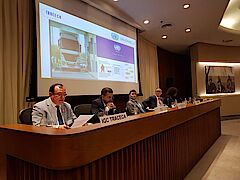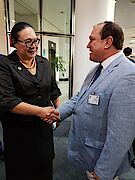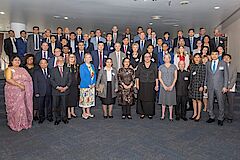Interregional cooperation in the Euro-Asian region within the Vienna Programme of Action are on the discussion of the international communities, organizations and bodies: UNESCAP, UN-OHRLLS, UNECE, TRACECA and etc.
The Landlocked Developing Countries face too many challenges due to their geographical situation. To address the challenges of the LLDCs, the international community adopted in 2014 the Vienna Programme of Action (VPoA) for Landlocked Developing Countries for the Decade 2014-2024. Nearing the halfway in the implementation of the VPoA, the LLDCs exhibit mixed results in their progress in achieving the priorities of the Vienna Programme.
In this regard, the UN Economic and Social Commission for Asia and the Pacific (UNESCAP), the UN Economic Commission for Europe (UNECE) and the UN Office of the High Representative for Least Developed Countries, Landlocked Developing Countries and Small Island Developing States (UN-OHRLLS) organized the Euro-Asian Regional Midterm Review of the implementation of the VPoA on 11-12 February 2019 in Bangkok, Thailand.
Upon official invitation of Mrs. Fekitamoeloa Utoikamanu, High Representative and Under-Secretary-General for the Least Developed Countries, Landlocked Developing Countries and Small Island Developing States, Mr. Mircea Ciopraga has also been participated and involved to the UNESCAP/UN-OHRLLS/UNECE Euro-Asian Regional Midterm Review of the Vienna Programme of Action for the Landlocked Developing Countries for the Decade 2014-2024.
The meeting was attended by senior government policymakers and other stakeholders from Euro-Asian LLDCs, transit countries, development partners as well as participants from the UN system, relevant international and regional organizations, including TRACECA, civil society representatives and the private sector from the Euro-Asian region.
The progress on implementation of the VPoA made by LLDCs and transit developing countries of the region was assessed along the six priority areas and based on the national reports, substantive regional report and through presentations from participating countries and work undertaken by UNESCAP, UNECE and UN-OHRLLS and other relevant organizations and discussions conducted during the meeting.
LLDCs and transit countries are encouraged to adopt an integrated and sustainable approach to transport corridors to maximize the contribution of transport connectivity to sustainable development. OHRLLS, UNESCAP and UNECE and other development partners are invited to support those efforts by providing policy, analytical and technical support.
During the meeting, Mr. Ciopraga stressed that the improvement of transport component is of key importance for TRACECA countries most of which are landlocked countries and TRACECA fully interested in successful realization of the Vienna Programme of Action for 2014-2024. “Facilitation of regional trade and trans-boundary traffic is one of the key factors of the economic development which in its turn promotes strengthening of regional stability and cooperation. Besides, ensuring regular trans-boundary traffic and reliability of the regional transport networks within the framework of the improvement of international transport corridors play a significant role in overcoming the difficulties typical of our region like for example the lack of direct access to the world ocean and as a consequence leading to the geographic dependence on transit services through the territory of the adjacent countries. We appeal to the international financial institutions to participate in this dimension” – mentioned by TRACECA Secretary General.
In addition, cooperation of the UN-OHRLLS and TRACECA to be built up on the basis of corresponding memorandum of understanding between two organizations in the future will create significant opportunities to mutually discuss the issues of employment of unused resources, increase of the volumes, diversification of trade, to achieve arrangements on intensification of joint activity in transport and economic cooperation, holding of joint working sessions on a regular basis.
On the results of the Meeting in Bangkok, the participants adopted the outcome document with the related assessment and recommendations for each priority area.
It should be noted that in order to address the challenges of the LLDCs, the international community adopted in 2014 the Vienna Programme of Action (VPoA) for Landlocked Developing Countries for the Decade 2014-2024. The VPoA, which is also an integral part of the 2030 Agenda for Development, offers a holistic approach to improving the integration of LLDCs into the global economy through the following priority areas: Fundamental Transit Policy Issues; Infrastructure Development and Maintenance; International Trade and Trade Facilitation; Regional Integration and Cooperation, Structural Economic Transformation, and Means of Implementation.
Country:
Mode:
Currently not available
Published:
Permanent Secretaritat of the IGC TRACECA








